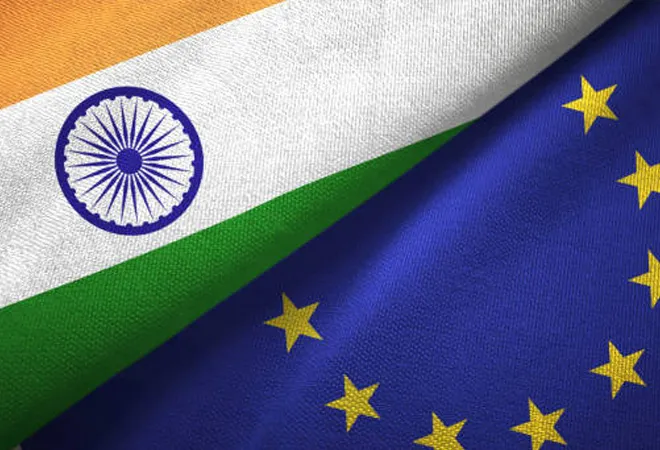
As the COVID-19 pandemic and its attendant consequences heighten tensions between the US and China, the effort to reform and rebuild a multilateral world order has only just begun. India and the EU—being home to the largest democracy and some of the oldest democracies, respectively—are in a unique position to lead this effort. Now is the time for the EU and India to enhance cooperation, strengthen and deepen their dialogue, and work towards defending a rules-based global order that facilitates sustainable growth, security and stability. As India prepares to host the G20 in 2022, the virtual India-EU Summit on 15 July is a step towards India aligning itself for a bigger and more diversified role in the emerging world order.
Isolation and exclusive politics are neither desirable nor practical. Globalisation, albeit with trusted partners and regions, is still the way ahead for millions to realise their aspirations. India and the EU could benefit from a relationship based on mutual trust.
This pandemic has proven, without a doubt, that public health is one of the most important global security challenges. It has also placed technology and innovation at the centre of the solutions to the global health crisis, with telehealth, contact tracing apps, and video conferencing platforms being the anchors enabling human activity to continue. Indeed, the India-EU Summit, which is being held virtually, is a testimony to this.
As the world moves away from a global supply chain that is overly dependent on China, India emerges as the most natural ally for the EU in this regard. Europe’s dependence on Asia for life-saving health goods has been starkly revealed during the current pandemic. With India’s vast drug manufacturing capabilities and the EU’s technical expertise, a partnership between the two for the exchange of ideas, innovations, and capabilities in the health sector will benefit both regions.
The same also rings true in the information and communications technology (ICT) sector. Cooperation between India and the EU in ICT could range from building strategic autonomy in the digital sphere to investments in emerging and disruptive technologies. As the 5G debate continues, an alliance to protect and enhance cyber security will also be crucial and necessary.
To mark the occasion of the India-EU Summit this year, ORF asked political leaders and policymakers, members of leading think tanks, academics and thinkers from across the EU and India to express their vision on the evolving relationship between India and the EU. Here is what they had to say.
Technology and Climate Partnership is the Way Forward
Alena Kudzko
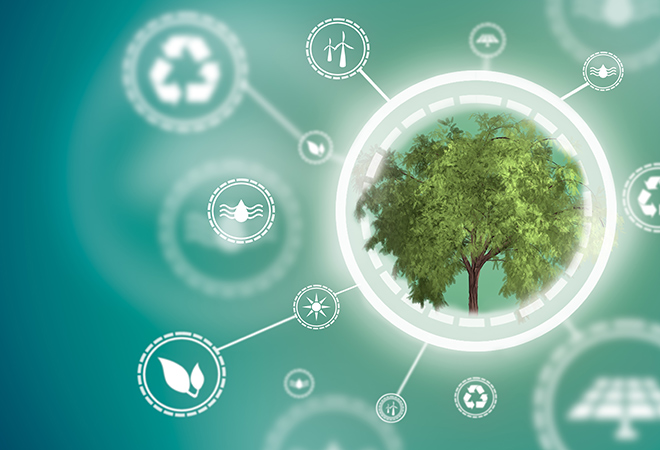 Source: Getty
Source: Getty
Heading into the EU-India Summit, both sides are guided by a realisation that they need to rethink, reshape and diversify their political, economic and technological dependencies.
Technology and climate are EU priorities and leaders know they cannot achieve them alone. India, meanwhile, needs to forge new relationships in a post-Brexit EU to advance its own policy aims and better capitalise on an underutilised partnership with the EU.
Spurred by the pandemic, US-China trade war and US unpredictability, Europe is particularly cognisant of the fragility of supply chains, the risks that come with an overreliance on China, and the need to strengthen the global community of democracies.
Both India and the EU require strong domestic technological bases to remain competitive. Options for bolstering these industries include talent exchanges, the facilitation of work permits for students and professionals, rules on reciprocal market access for businesses, joint innovation initiatives, and funding for joint research projects.
Considering China’s ascendancy, the EU and India now share a stronger political interest in shaping global norms and standards in the technological domain, including rules on information flows and the ethical application of technologies like facial recognition. The global dividing lines are epitomised especially by discussions on 5G and associated lock-ins on infrastructure, standards, security protocols, and the potential weaponisation of technological interdependence.
To this end, the EU and India should seek out ways to converge technological safety protocols, privacy provisions, and investment screening approaches. The recognition of data protection equivalency would also enable data transfers that are necessary for the development of digital industries. It would also be prudent to jointly promote democratic principles through institutions like the Global Partnership on Artificial Intelligence and the D-10 (G-7 countries plus Australia, South Korea, and India, and other like-minded democracies) alliance, and by incentivising supply chains that abide by shared standards.
To ameliorate supply chain concerns, the partnership should further develop the ICT and manufacturing sector in India, enhance capacities for sourcing components and supporting technology, including for the EU’s two 5G frontrunners, strengthen governmental and industrial collaboration to advance and roll-out technologies, and adjust EU-India trade policy to facilitate digital trade.
In the area of climate, the Paris Agreement and EU-India Clean Energy and Climate Partnership provide a foundation to build on. The EU-India agenda here should include the promotion and de-risking of investment in renewable energy and green technology, the channeling of post-COVID-19 stimulus into green infrastructure, joint research and development, and business-to-business cooperation to contribute to the green transition.
The EU and India can further facilitate the creation of institutions that attract financing to sustainable growth, modelled, for example, on the Green Growth Equity Fund created by the UK and India or private financial initiatives like Tata CleanTech Capital Limited.
In Times of Strategic Confusion, Deeper Dialogue is a Must
Carl Bildt
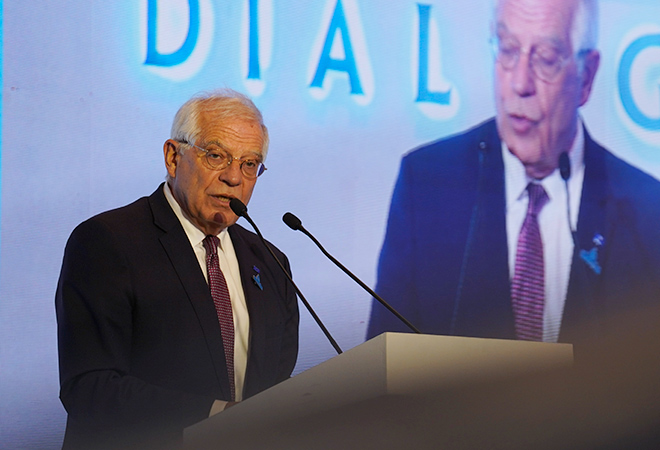 Source: PhotoLabs@ORF
Source: PhotoLabs@ORF
For an EU that has expressed a more geopolitical ambition, the virtual summit with India is an important event, providing the opportunity to further develop a relationship that offers vast possibilities for the future.
There are certainly problems that should not be ignored. The ambitious start in 2007 of efforts to negotiate a broad-based trade and investment agreement stalled in 2013 and hasn’t shown any progress since then. Questions have been also been raised in EU business circles over the slowing down of economic reform in India. And there were serious concerns expressed in the European Parliament earlier this year over India’s passage of the Citizenship (Amendment) Act.
The relationship got off to a good start this year. The new EU High Representative Josep Borrell chose the Raisina Dialogue in January as the venue for his first major policy speech, and India’s External Affairs Minister S. Jaishankar visited Brussels for high-level talks in February.
But then handling of the COVID-19 crisis became a priority in both Brussels and New Delhi.
Cooperation on global health issues—COVID-19 and beyond—should be an important theme at the summit. The EU took the lead at the recent World Health Assembly to chart a way ahead for reform of the World Health Organization, and with the US out of the game and China carrying baggage, the EU and India should be natural partners in discussing vaccine issues and future pharmaceutical production opportunities.
Both the EU and India are committed to upholding a functioning multilateral system, but with this under increasing strain, it is an increasingly important area of cooperation and stronger efforts should be made to develop a common approach. Apart from global health concers, there are the issues associated with the reform of the World Trade Organization, respective climate policies as the important COP26 at the end of 2021 nears, and a large number of issues related to the ever-more important digital questions.
Digital concerns will grow in importance, and this is an area where the EU and India need to develop their respective global approach to not be torn apart by the rivalary between the US and China.
But it is most important to seek a deeper dialogue in a period of strategic confusion and increased great-power rivalry. As relations with China are under review in both countries, Brussels should listen attentively to the New Delhi assessment of the recent conflict with Beijing in the Ladakh and its long-term ratifications, and it must demonstrate that it understands and is prepared to support the increasingly important role India will play in the Indo-Pacific area.
This will be the economic and political point of gravity in the world in the decades ahead, and relations with India will thus be of increasing importance for the EU. As per present trends, in a few years, the Indian economy will equal the EU’s and be the second largest in the world after China. It is a partner no one can neglect, and the EU has every reason to give the relationship more weight than has been the case so far.
Bolstering India-EU Partnership Beyond the Trade Pact
Indrani Bagchi
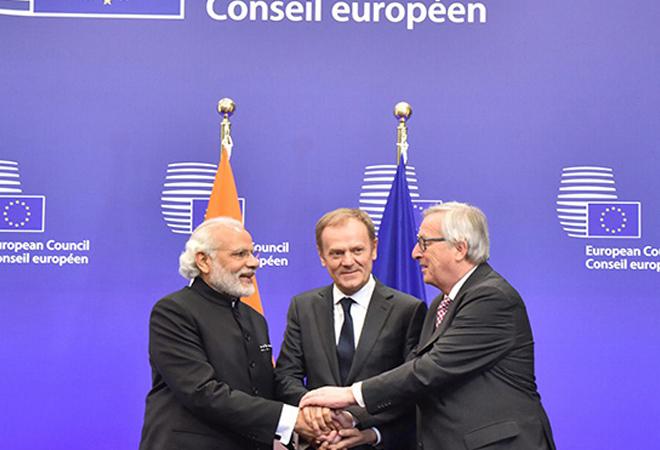
For too long, India-EU relations have been held captive by the diminishing promise of a free-trade agreement (FTA), the prospects of which dimmed further when India cancelled all investment protection agreements in 2017. Trade talks have gone nowhere since 2013, and with India primarily approached its relations with the EU through the prism of trade and economics, the larger relationship has also really gone nowhere. The EU has long played second fiddle to India’s bilateral relationships with the big three (the UK, France and Germany).
All that has changed, as the Indian government demonstrated its bonafides by staying the course on climate change. Not only did India tip the balance by signing on to the Paris Accord but it reaffirmed its commitment even after the US walked out. For a lot of Europe, having India taking on climate change responsibilities is very important. In addition, the Indian government enthusiastically declared it would embrace European technology for the India transformation project, which stretched from clean and smart cities, to clean rivers and even sanitation.
In 2020, with a pandemic ravaging countries and economies, the India-EU cooperation agenda should include a whole new menu. First, being able to access European healthcare technologies and leveraging the Indian market to scale them up for the rest of the world. This is a particularly good fit, given India’s own successes as the world’s largest pharmaceuticals manufacturer. Therapeutics, disease management (beyond COVID-19) and preventive technologies can be a productive partnership. Second, on 5G, India has been interested in both Nokia and Ericsson as collaborators of new-age telecommunication technologies. India will certainly not go the Huawei route. That leaves open the possibility of Indian startups collaborating with European tech giants on not just 5G, but to take forward research and development on 6G as well.
Post COVID-19, the India-EU relationship will not centre on the FTA, but more on whether India and EU member states can become part of “trusted” networks for global supply chains.
In 2018, Indian President Ram Nath Kovind said in Greece, “The 21st century will be built by democracies such as ours – democracies that place a premium and a priority on the wellbeing of common citizens; on jobs and opportunities for local communities, and on a global development model that is economically viable, ecologically sustainable and ethical in its architecture. In the pursuit of these goals, Europe will find no better companion than India.”
India-EU Partnership Must Rise to its Potential
Gurjit Singh
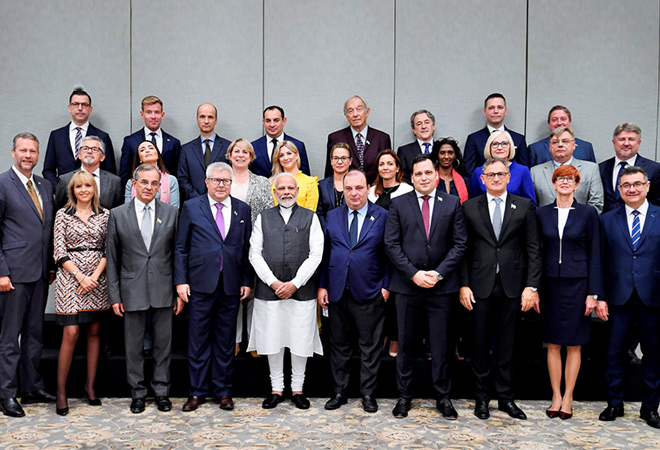
The 15th India-EU Summit is the first since Brexit and the new EU leadership taking over in December. The global context of the summit is vastly different given the unexpected COVID-19 pandemic and the hard knocking by China at its borders, with neighbours make the global scene more demanding of hard policy than the soft options the EU mostly takes.
The Broad-based Trade and Investment Agreement and the 30 other bilateral instruments of engagement have only led to an underperforming partnership. Reformed multilateralism and the need to have global rules abided by are foremost in our thought. But these need real application, not exchanges of homilies. Will the EU step out of 'the dreary desert sand of dead habit' and walk engage with India without fear in a new partnership focusing on China and what the EU itself believes is a systemic rival?
About 6000 EU companies are invested in India but EU investment in India is half that in China. The EU needs to deal with India with new geopolitical interest. It ought to encourage more investment in India. It can do more with the connectivity agenda and provide support to infrastructure that is also green through strategic low-cost financing. These can also be extended to Southeast Asia, Africa, and West Asia. The EU can, through its members, play a bigger role to support the free and open Indo-Pacific. It can raise the costs for China as it continues to breach international rules brazenly. And the EU could try and make more supportive statements unlike their bland one after the Galwan clashes.
The effort has to be to make the India-EU partnership rise to its potential and provide a new model for international relations today.
The Advantage of Diversity for a Multilateral World Order
Volker Perthes
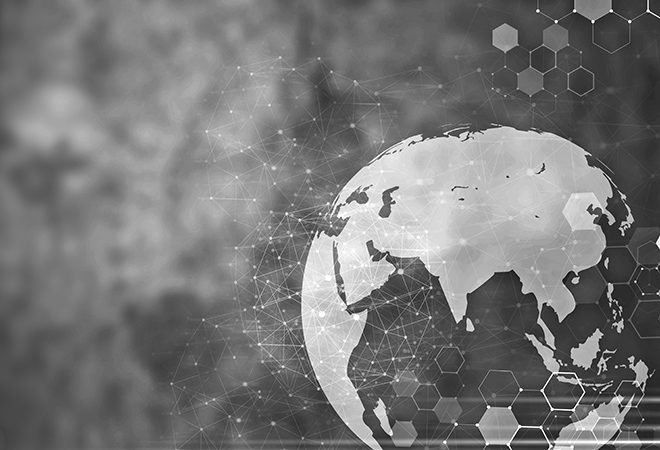 Source: Getty
Source: Getty
India and the EU are ideal partners to make a difference in an international environment that is increasingly shaped by
strategic rivalry between the US and China. They have a common interest in avoiding a bipolarised world and developing the rules-based international order. They are credible defenders of the international rule of law, not least the
pacta sunt servanda principle. They see strong and effective multilateralism as a preferred mode of international cooperation. That is why Germany and France have taken the initiative to launch the
Alliance for Multilateralism—an informal network of countries that share a commitment to multilateral cooperation, upholding international norms and reforming international institutions—and why India has opted to join it. India and the EU should use this framework and other fora, such as the UN or the G20, to make the rules-based order and international institutions more efficient and inclusive.
India and the EU do not agree on every subject that is currently internationally debated. This is an advantage, not an impediment, for cooperation and common initiatives. Given the democratic and pluralistic nature of their respective systems, and their shared commitment to rule-of-law, both India and the EU have learnt to live with diversity, open debate and the need to find compromises. This makes it easier for them to bridge international differences and find solutions that can appeal to most states. Concretely, India and the EU would be well positioned to develop joint initiatives on the reform of the World Health Organization and the World Trade Organization. They can also take the lead in developing ideas for international standards and global governance in many other areas of common concern, such as global health, dealing with misinformation, data use and data protection or peacekeeping.
Cooperation between India and the EU and its member states necessarily extends beyond these multilateral frameworks. As Europe is partly readjusting its global supply chains to the lessons learnt from COVID-19, the importance of India as an economic partner for the EU is bound to increase alongside closer coordination and cooperation on regulations for FDI, product and health standards, or joint connectivity projects in third countries.
Dialogue and cooperation on international security and defence between India and Europe is also likely to increase, but this will mainly be on a bilateral or trilateral level with individual EU member states. India and the EU could make a common effort to improve their capacity to anticipate crises, challenges and opportunities that arise from global developments. For this purpose, India and the EU should set up a joint mechanism for common strategic foresight. Strategic foresight will of course remain a task for each side’s respective national (or supranational European) security institutions. Where one sits, however, also determines the challenges that one sees. And as foresight is supposed to make us aware of risks and opportunities that may not originate in the environments that we know best, there is a
good case for additional cooperative approaches with partners from different regional or cultural backgrounds. Given that strategic foresight, if taken seriously, includes the sharing and assessment of potentially sensitive data and assumptions about the behaviour of other actors, common foresight exercises demand a lot of mutual trust. This makes a broad multilateral approach difficult. India and the EU, however, are well suited to start such an exercise together, probably under the aegis of major think tanks, with a view to multilateralise it at a later stage. If done systematically and regularly, this will improve both sides’ capacity to anticipate risks and opportunities and, almost automatically, trigger common discussions about how to deal with them. And it would set an example for cooperation in a multilateral order.
Indo-European Partnership Key for Sustainable World Order
Alexander Kulitz
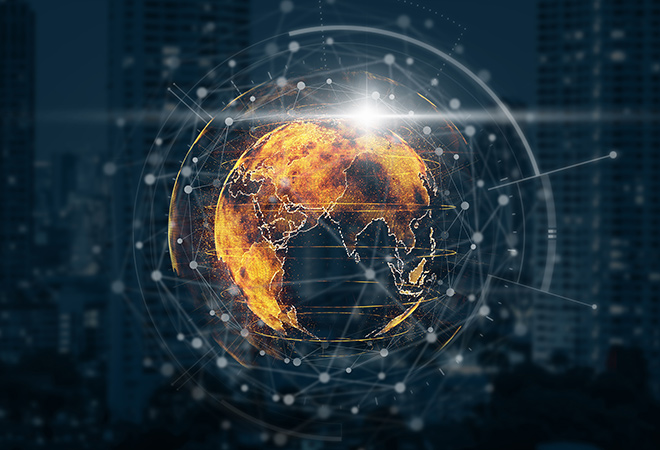 Source: Getty
Source: Getty
The EU and India need to play a vital role in finding a consensus on a multilateral, rules-based and sustainable world order. To be successful in achieving such an ambitious goal, India and the EU must consider each other as mutual partners and cooperate on global issues. One key to success is finding a common approach towards countries that do not fully share liberal and democratic values. A joint and pragmatic approach towards China and other powers, respecting each other’s sovereignty, will be essential. It is in our interests to find a multilateral global order to secure free markets and fair trade. In a world of competing political systems, the aggressive use of economic policies as a tool to pursue national interest must be confronted with a rules-based, multilateral system that the global community is willing to comply with. An Indo-European partnership is therefore dearly needed to shape an innovative, sustainable and economically successful foundation for a secure and sustainable world order.
The first step towards a closer bond between India and the EU must be the completion of an extensive Free-Trade Agreement to unlock the economic potential of this cooperation. The EU and India are among the world´s largest economies and markets. The EU is India´s largest trading partner and one of the largest investors in India. An ambitious and comprehensive trade and investment agreement will strengthen our economic relations and will support the effort to reform international institutions such as the World Trade Organization.
India- EU Cooperation in Times of Global (Dis)Order
Ummu Salma Bava
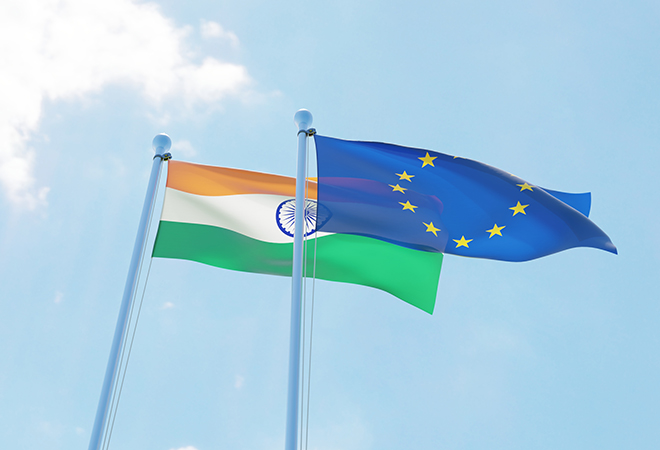 Source: Getty
Source: Getty
Navigating the unprecedented global uncertainty brought about by multiple factors has heightened the focus on partnerships in foreign policy. Never has the imperative to enhance bilateral and multilateral cooperation been as evident as under the present COVID-19 crisis. Both India and the EU need to refocus on strengthening multilateralism by expanding cooperation and redefining global public goods to include public health. The pandemic has revealed that global problems are not defined or blocked by geographic and political borders, it has produced a collective global political vacuum, and it has unleashed large scale economic distress that threatens global economic stability and prosperity. While both India and the EU may not have a large global convening power, a ‘partnership in leadership’ is the way forward since joint political and economic action needs a sustained refocusing of the partnership to prioritise the agenda for regional and global cooperation. By converting the pandemic as an opportunity for joint leadership to address the shifting geopolitical equations, India and the EU could jointly present their ideas on their collective action on the pandemic at the UN General Assembly in September. They could also enhance political cooperation in developing the rules for cyberspace and security that will impact the growing digital economy and redefine security threats, access, economic growth and prosperity. And they could reinvest in multilateralism by becoming an indispensable partner to each other in supporting and shaping global institutions. EU High Representative Joseph Borrell said last week that, “in a world of disorder, Europe needs partners”. The summit offers the opportunity to refashion the India-EU strategic partnership by committing to a new roadmap that brings together leadership and resources to address common challenges.
Towards a Digital Technology Alliance
Izabela Albrycht
 Source: Getty
Source: Getty
The geopolitical shift accelerated by the COVID-19 pandemic and fostered by strategic technological competition between the US and China posed a challenge related to dependencies in the global digital supply chain, among other things. As a result, on the one hand we see the debate on the need to develop strategic digital autonomy across governments and the private sector, and on the other we see countries’ political and economic dilemmas of choosing one side of the contention. Two important “hot spots” are India and EU, with both facing new threats and opportunities, which should encourage them to search for avenues of cooperation.
The new geopolitical and geo-economics landscape will trigger a reinterpretation of interests and political alliances, and require strategic considerations regarding industrial and innovation policies, trade agreements and market interventions.
It is a time for the EU, which has some of the oldest democracies in the world as its members, to deepen cooperation with India, the largest modern democracy, over what is perceived as the most important leverage of power in the 21st century—digital technologies and their applications. The collaboration can include developing common ethics and a set of principles that should underpin technology development and deployment. The best practices of building fundaments of strategic autonomy and a regulatory regime for the new digital world must be shared. There are also several possible dimensions of economic collaboration between India and the EU, including rare earth materials exploration and extraction; research and development and innovation cooperation in the field of disruptive and emerging technologies; foreign direct investment in the information and communication technology (ICT) sector; and startups. The importance of ICT cooperation was already underlined in the
EU-India Agenda for Action-2020, and its operationalisation is needed now more than ever.
This collaboration should be extended by a common approach to cybersecurity in the whole supply chain. The EU and India should support a coalition of like-minded countries that are trying to deal with these emerging challenges, for instance, by developing the idea of D-10 (G-7 countries plus Australia, South Korea, and India, and other like-minded democracies) aiming to address the issues of both 5G networks and supply chain vulnerabilities.
Establishing a Far-Reaching Partnership
Velina Tchakarova
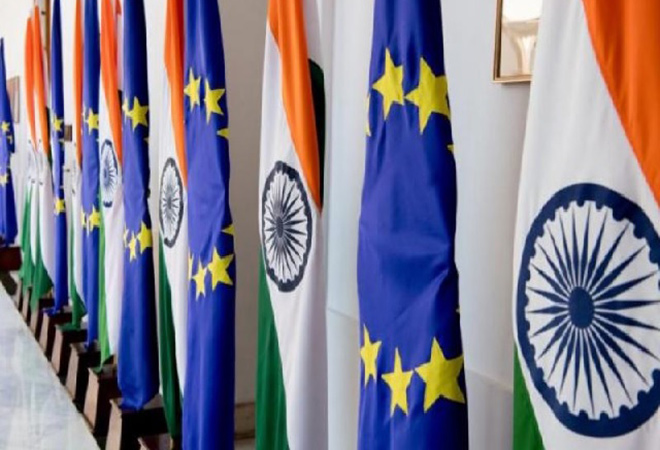
India and the EU represent two of the world's largest economies and thus are important players in global economic and trade governance. Currently, the global system reveals an emerging network of regional actors, which seek to navigate the systemic rivalry between the US and China. Following COVID-19, they have a common goal—to play a balancing act between Washington and Beijing without being forced to make the difficult choice of taking sides.
Against this background, the EU and India could unlock the potential of their strategic partnership to bring about a more sustainable, rules-based world order by deepening their relations in several key areas. Sectors such as the greening of the economy, renewable energy, artificial intelligence, and digitalisation tools can expect strategic investments to promote the growth of new, regional power centres that can broaden the EU-India cooperation. Furthermore, the reconfiguration of the global supply chains could create new synergies in terms of business and connectivity between Europe and India. Concluding a Free Trade Agreement will strengthen their global positioning in the current multilateral architecture, with a special focus on common responses to global and regional challenges. The EU and India could adopt a coordinated approach in their external actions to further deepen their partnership on various shared sustainable development goals, such as global energy decarbonisation, a modern resource-efficient economy with smart urbanisation, and a sustainable environment based on clean energy. Moreover, Brussels and New Delhi are natural partners in maritime security and should enhance their cooperation in foreign and security matters considering the Indo-Pacific region.
Deepening the political and socio-economic dimension of the India-EU relationship through an intensified dialogue on all levels will generate mutual interest and trust to establish a far-reaching strategic partnership that is indispensable for the maintenance of the rules-based global order.
Technology Innovation is Key for Stable Global Order
Stefania Benaglia
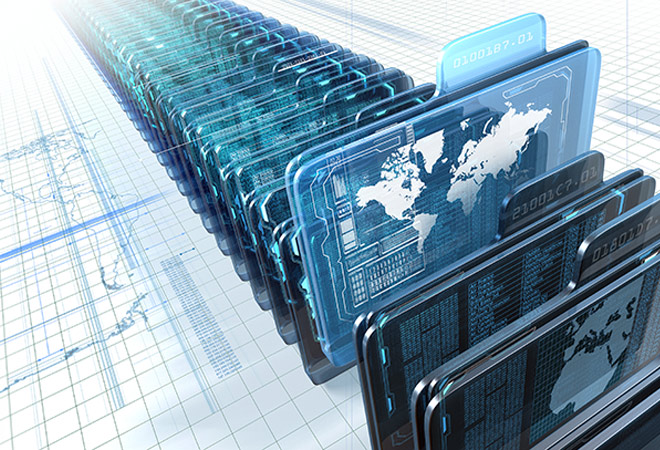 Source: Getty
Source: Getty
Changes are unavoidable, and in today’s world, stasis means regression. Technology is the area where the EU and India’s shared interest have more potential.
Leadership in technological innovation is a key ingredient in global power projection
. Jointly developing pioneering technologies, such as 6G and cloud technology, would open enormous business opportunities, while limiting the dependency of third countries—notably, China and the US. Such an endeavour can be undertaken through increased economic cooperation.
To do so, the EU needs to increase its power to attract Indian talent, which was mostly heading towards the UK. The UK was indeed the biggest recipient of the Indian diaspora amongst the EU member states, hosting about 65 percent, followed by the Netherlands (about 8 percent), and Italy and Germany (both around 6 percent). To attract Indian talent, the EU should streamline the process for obtaining a Schengen visa for skilled Indian workers and their immediate family members.
At the same time, India should attract the EU investments, which might be moving out of China, in an attempt to achieve diversification of the strategic value chains, and therefore reducing economic dependency from China.
The EU and India have a lot in common. But should differences prevail on commonalities, it will be to the benefit of the US and China, which would impose, unchallenged, their technological supremacy on others, including the EU and India.
Health Sovereignty and the Indo-Pacific
Tara Varma
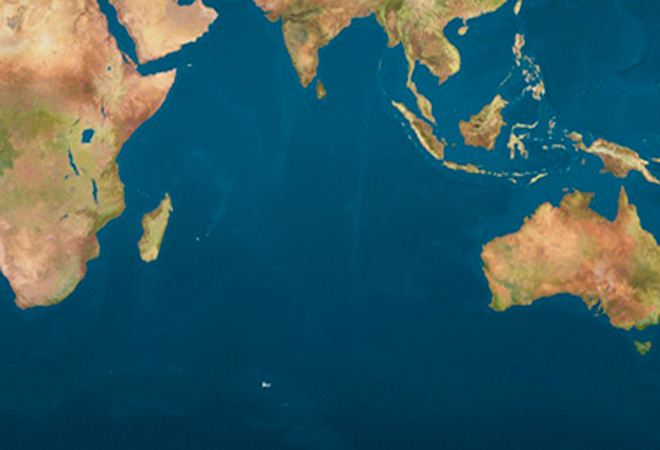
When the COVID-19 crisis hit the old continent, a stark dependency on Asian countries for critical health goods was revealed. The post-COVID-19 world provides a moment for European governments and the private sector to review and adjust their value chains for greater health sovereignty. Supply chain resilience is one area where European health sovereignty and the definition of a European strategy for the Indo-Pacific could go hand in hand. The Indo-Pacific remains a security concept, in the traditional acceptation of the term. But the crisis has taught Europeans and others that health is as much an element of security as defence or telecoms.
As detailed in a
paper published in June 2020, Europe has a general interest in remaining open for trade; and complete independence, even just in the health sector, is unrealistic and undesirable. It is Europe’s openness that assures its innovation capacity and determines whether Europeans will still produce the leading pharmaceuticals of the future. Europe’s review of supply chains should group products according to how critical they could be in a health crisis and how vulnerable they are to economic coercion. The EU could perform this analysis by bracketing products according to four key actions—reshoring, near-shoring, diversification, and chokepoint vulnerabilities.
This economic openness will have to be complemented with some regulation. Calls for the EU to define its strategic interests are not new but the crisis demonstrated that this process must occur sooner rather than later. The review of supply chain resilience should conclude with recommendations for the EU to establish priority partners. India is already a major partner for Europe in supplying medicine and developing research. India has joined Europe in the fight for multilateralism and this could expand European engagement in the Indo-Pacific. In light of increasing China-US tensions, Europe and like-minded Asian countries could find a common path forward together when ensuring supply chain resilience to provide health sovereignty to their citizens and when fighting to reform the global system to respond to health emergencies. The EU-India summit’s agenda raises the possibility of this relationship finally living up to expectations. Last week, a participant in a seminar on intra-EU relations pronounced this sentence: “Let’s not dream about solidarity but about common interests”. We can paraphrase this motto for the EU to engage with India on the Indo-Pacific, particularly on global health issues.
Furthering the Multilateral, Rules-Based World Order
Paolo Magri

India and the EU are not only two of the world’s largest economies, they also are the world’s largest democracies. Both share the conviction that a rules-based international order rooted in multilateral institutions and cooperation has been a key driver for global growth, peace and stability. As this order is being challenged worldwide, with ambiguous US priorities on the one hand and increasing Chinese assertiveness on the other, India and Europe should be encouraged to scale up the scope of their partnership. This is true even more so in a time where the COVID-19 pandemic has accelerated global polarisation, highlighting the importance of solidarity and effective multilateral solutions in a rapidly changing world.
First, Europe and India share an interest in sustaining a rules-based multilateral trading system with the United Nations and the World Trade Organization at its core. Hence, they should not only push their trade negotiations to the next level but also join forces to carry out a frank review of the current multilateral framework, aimed at underpinning a fair and predictable global trading environment.
Second, with the US pulling out of the Paris climate agreement, India and the EU stand to gain from a joint leadership on global governance matters such as climate change, clean energy or circular economy. Cooperation on these issues should be taken to the next level, moving from commitment statements to joint action.
Third, India and EU should seek to lead the discussion on multilateral solutions to the great challenges of today—from the regulation of emerging technologies to the digital economy, from cybersecurity to global public health security. On these matters, India and the EU have the credentials to become standard setters for fair discussion and negotiation. Starting with the EU-India Summit 2020, they should encourage their allies and the global community to follow their approach.
Balancing the Imbalance
Shruti Pandalai
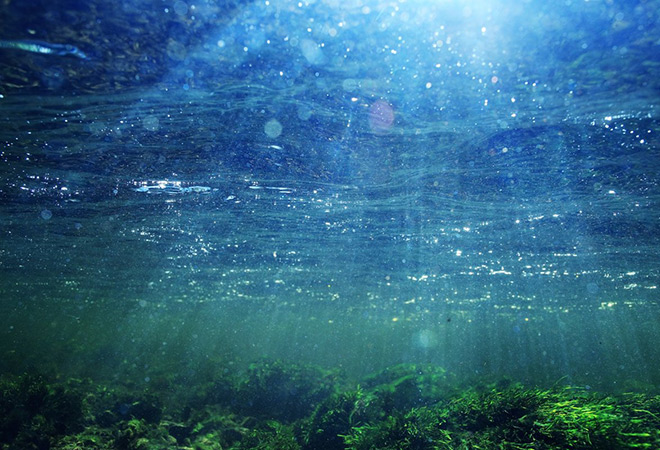
In 2017, Prime Minister Narendra Modi’s message in Germany was simple but potent: “India wants the world not just to be interconnected but also that it should be sensibly run”. This explains why ‘more multilateralism not less’ remains the leitmotif that anchors the India-EU relationship. The last four years have been transformative across sectors, aided by political will from both sides. However, the scope for more potential has often plagued Brussels and New Delhi since the relationship has not yet been mainstreamed in the public discourse. There is now an opportunity to remedy that.
The political churning in Europe over managing the China relationship, diversifying partnerships to balance transatlantic fissures and demand accountability in international governance mirror Indian concerns. The Indo-Pacific provides a low hanging fruit for the partnership to deliver on priority areas like maritime security, connectivity, counter terrorism co-operation and building consensus on interests in West Asia and Africa.
India’s vision of Security and Growth for All in the Indo-Pacific, especially in the India Ocean region (IOR), has found an important partner in the EU. There is a need for a comprehensive, multilateral maritime security and governance regime for the IOR, and the EU shares India’s interests.
Apart from deepening existing defence cooperation, the scope to enhance joint scientific research on maritime issues, under the remit of the EU’s Blue Growth initiative that compliment India’s ‘Blue economy’ plans, is immense. India is carving out a normative leadership role for itself through its principled stand on sustainable connectivity; the EU’s success in terms of regulatory frameworks—putting in place transparency measures on investment in infrastructure and digital connectivity—can buttress India’s efforts.
Opportunities are plenty. India and the EU have done well in moving from talking at each other to talking to each other. Now is the time to act fast and use the momentum to co-ordinate responses. India believes that in this extraordinary global situation, it can play a positive role. India and the EU together could be the voices of reason, to balance the imbalance.
A Virtual Search for a New Paradigm
Bhaswati Mukherjee
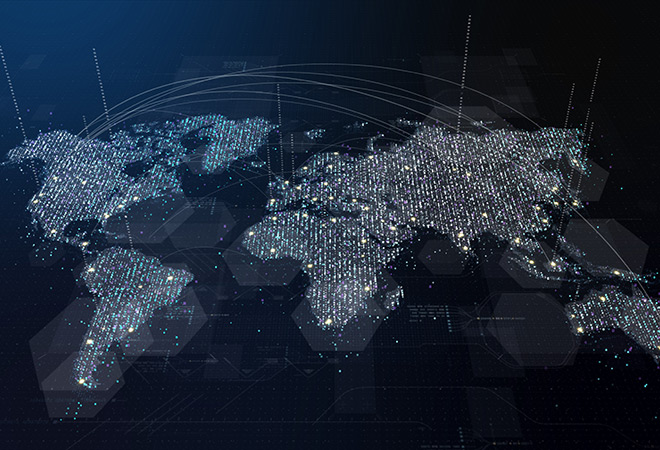 Source: Getty
Source: Getty
India and the EU have travelled a long way from the 1
st Summit held in June 2000 in Lisbon to now holding one under the shadow of COVID-19, increased Chinese militarism and aggressive expansionism in its neighbourhood and the South China Sea, along with a shrinking global economy and world trade. The EU is at the crossroads, facing the difficult dilemma of increasing nationalism and conservatism at the expense of closer integration. As for China, the EU’s most important trading partner, the EU is being forced to acknowledge, somewhat reluctantly, that its rise represents a fundamental threat to the Western liberal democratic values, enshrined in the EU’s institutions and the Lisbon Treaty.
The 15
th Summit’s postponement was due to election of new teams on both sides. The pandemic resulted in a second change of dates and uncertainty about the continued Summit process. A virtual Summit, on 15 July, will ensure that the leadership on both sides are able to agree on a political declaration that would announce a common and agreed position on major international and regional issues, as well as concerns in India’s own neighbourhood.
As expected, there has been speculation about a ‘trade deal’. The failure to kick start the long-stalemated negotiation on the Broad-based Trade and Investment Agreement represents a constant irritant in the common quest to discover a new strategic paradigm. Having pulled out of the Regional Comprehensive Economic Partnership last year, there has been speculation of India doing separate deals with the US and EU so as to entrench itself in the global supply chains. With the West, especially the US, trying to corner China on trade, there is expectation of forward-looking language on at least a limited trade deal between India and the EU.
It is also expected that both sides would focus on cooperation to manage the pandemic, including the search for a vaccine, and to address together the challenges COVID-19 poses to multilateralism and the new emerging world order. India being at the helm of affairs at World Health Organization at this juncture is of particular significance.
From this perspective, the 15
th Summit will certainly break new ground. It is hoped that both sides will demonstrate the necessary political will and recognition of each other’s strength and importance in an increasingly challenging international scenario. The international community can expect no less. Both sides must rise to these formidable challenges and lead the way forward.
India and EU Must Build the Institutional Architecture for New Global Governance
Gulshan Sachdeva
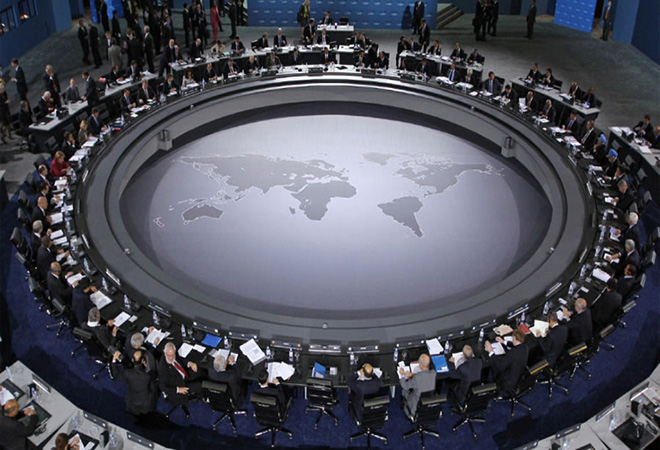
The post-COVID-19 world may be a different world altogether. The world order was already in transition; COVID-19 has accelerated this change. Although the pandemic is still unfolding, its health and economic impacts are clearly visible throughout the world. The western world order under the leadership of the US is already weakened. China is expanding and asserting, but suspicions about Beijing are also growing. This may disrupt the centrality of China in global value chains. Multilateral institutions including the World Trade Organization and the World Health Organization are far less effective. The EU and India believe in a democratic and multipolar world, and would like to promote effective multilateralism. Neither India nor the EU are seen as threatening powers by most countries of the world. Due to economic disruptions created by the pandemic, most Sustainable Development Goals are less likely to be achieved. As major players in the OECD-DAC and South-South Cooperation respectively, both the EU and India can build an inclusive global development architecture.
The EU has been a pioneer in climate change related issues. It is also emerging as a leader in green technologies. India’s ambition in renewables is reflected through the International Solar Alliance. If they bring together their capacities, a large number of other countries can be attracted towards a sustainable future. Coming together, they will bring capacities, experience and legitimacy in the institutions of global governance. Both have strong and complex ties with other major powers like the US, Russia and China. To be effective together, they must upgrade their policy coordination and mutual understanding about other players. Europe’s faith in transatlantic alliance and India’s hope from an alternative norm building through the BRICS are low today. Therefore, to resolve many of the existing global challenges, Europe and India must start working together for a new institutional architecture of global governance. Ultimately, this may lead to a sustainable rule-based order in the world.
India-EU Cooperation in Climate Change and Technology
Manjeev S Puri
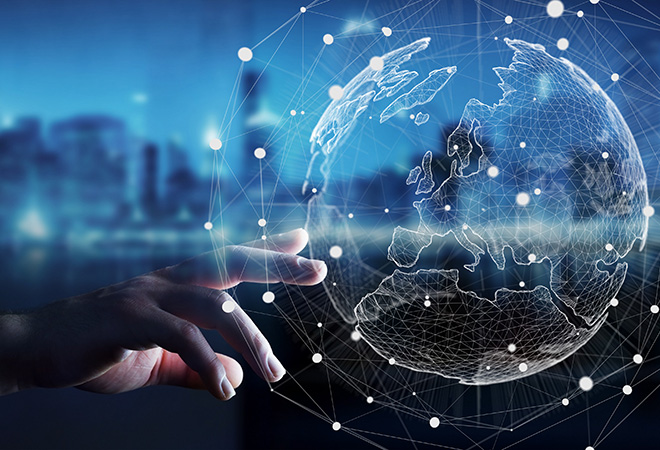
The COVID pandemic could reduce global GDP by 5% but the economic lockdown has proved a boom for the environment, at-least in the short run. Global CO2 emissions may fall by an estimated 8% this year and put us back on track of realizing the Paris Accord goal of limiting global temperature rises to between 1.5 – 2 Deg. C. COVID will also provide a unique opportunity to build back green.
India is on track to meet (and exceed) two out of three of its quantified NDC targets by 2030: (i) reducing emissions intensity of GDP by 33-35% from 2005 levels and (ii) achieving 40% non-fossil fuel electric installed capacity. A domestic target of 30% EVs by 2030 has also been recently announced.
The EU appears on-track to meeting its NDC goal of reducing emissions by “at least 40%” and may submit an enhanced NDC this year. With the “European Green Deal” the EU hopes to achieve net zero emissions by 2050.
As key stakeholders in the defining challenge of our times – Climate Change - robust India-EU relationship, including climate diplomacy, to support stronger climate action is a must. This should involve development of long-term strategies on emission reduction, adaptation and building resilience. Participation of young people in these efforts is a must. These efforts must also push meaningful action at a global level bearing in mind the principle of common but differentiated responsibility and developmental needs of developing countries. And, technology must be a key in the way forward.
Areas of potential India-EU collaboration include (i) resilient recovery from COVID (ii) building resilient infrastructure, especially in view of increased extreme weather events and (iii) increased industry participation - India is a leader in renewables but needs decarbonizing in heavy industry and heavy-duty transport, where Europe has experience and novel technologies. Indeed, India and the EU could be strategic partners in developing of hydrogen-based technologies,
On the shifting centre of economic power
Karel Lannoo
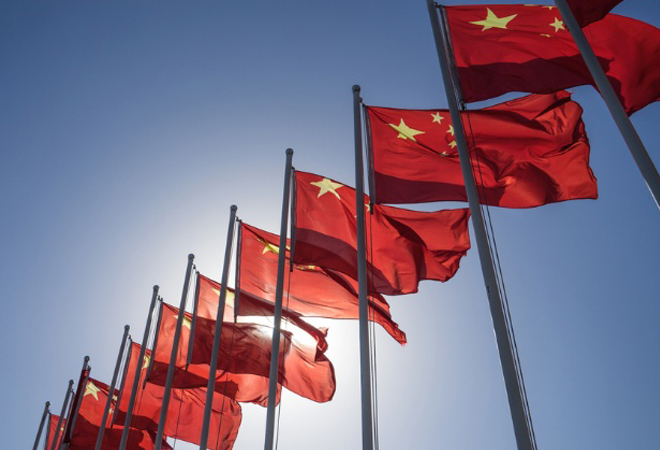
EU-India relations, while going back a long way, have not been going that smoothly recently. Given the central role of India in Asia, and the opportunities for closer cooperation, the 15 July 2020 EU-India Summit is to be welcomed.
Following the EU's 2018 Communication, there are many arenas where both blocks can work closer together, which are currently not sufficiently on the radar screen in Europe. These include the matter of security cooperation in the Indian Ocean, where both cooperate already; there is an enormous trade agenda, where much remains to be done; and there is the geopolitical agenda, to keep India, as the most populous democracy in the world, clearly in the Western camp.
India's position relative to other powers on the Asian continent should be a reminder for the Europeans to take its geopolitical ambitions seriously. As the centre of the world’s economic power gradually moves eastwards, so will the importance of the Indian Ocean Region, which is between Africa, China and the Pacific. On the trade side, the increasing tendency of the EU to set environmental and labour markets standards as part of bilateral agreements will not facilitate these discussions.
In a post-COVID context, both sides should pursue a global health policy and sustainability agenda, and work towards strengthening the role of international organisations, most importantly the WHO and WTO. The world is in need of a more coordinated approach to tackle the consequences of the crisis, rather than the unilateral approach that has prevailed so far. Both sides could coordinate on initiatives to bring together health policy experts and international economic policy institutions.
The importance of setting a new normative framework for State-owned enterprises
Akshay Mathur

India and the European Union can work towards a global framework for regulating state-owned enterprises (SOEs). Both India and the European nations take pride in its private enterprise and free markets, as also their regulatory institutions and corporate governance framework. However, Indian and European enterprises are increasingly side-lined in global competition due to the disadvantageous rules on SOEs. Therefore, an issue-based partnership on regulating state-owned enterprises can help set new norms for all the nations in the world to follow.
Of course, this initiative is partly directed at China, which today has the largest number of state-owned enterprises, and is increasingly beating competition from private entities from other nations due to support from Chinese government coffers. This needs to change.But this initiative is also directed at global financial stability, since SOEs distort market competition, particularly price discovery and fair competition. More and more trade agreements are including chapters on regulation of SOEs to enable fair trade.
India and the European nations have SOEs as well. India’s SOEs, known as Public Sector Units (PSUs), play a major role in the Indian economy. European SOEs also enjoy some government support, particularly in France and Italy focused on energy and transport. However, their contribution to the economy is limited and they are being increasingly privatised. For those that are still under public governance, there is transparency in their business transactions due to strict domestic regulatory requirements. This makes SOEs from India and Europe significantly different from the SOEs operating in the international business environment with opaque financial disclosures.
The views expressed above belong to the author(s). ORF research and analyses now available on Telegram! Click here to access our curated content — blogs, longforms and interviews.




 Source: Getty
Source: Getty Source: PhotoLabs@ORF
Source: PhotoLabs@ORF

 Source: Getty
Source: Getty Source: Getty
Source: Getty Source: Getty
Source: Getty Source: Getty
Source: Getty India and the EU represent two of the world's largest economies and thus are important players in global economic and trade governance. Currently, the global system reveals an emerging network of regional actors, which seek to navigate the systemic rivalry between the US and China. Following COVID-19, they have a common goal—to play a balancing act between Washington and Beijing without being forced to make the difficult choice of taking sides.
Against this background, the EU and India could unlock the potential of their strategic partnership to bring about a more sustainable, rules-based world order by deepening their relations in several key areas. Sectors such as the greening of the economy, renewable energy, artificial intelligence, and digitalisation tools can expect strategic investments to promote the growth of new, regional power centres that can broaden the EU-India cooperation. Furthermore, the reconfiguration of the global supply chains could create new synergies in terms of business and connectivity between Europe and India. Concluding a Free Trade Agreement will strengthen their global positioning in the current multilateral architecture, with a special focus on common responses to global and regional challenges. The EU and India could adopt a coordinated approach in their external actions to further deepen their partnership on various shared sustainable development goals, such as global energy decarbonisation, a modern resource-efficient economy with smart urbanisation, and a sustainable environment based on clean energy. Moreover, Brussels and New Delhi are natural partners in maritime security and should enhance their cooperation in foreign and security matters considering the Indo-Pacific region.
Deepening the political and socio-economic dimension of the India-EU relationship through an intensified dialogue on all levels will generate mutual interest and trust to establish a far-reaching strategic partnership that is indispensable for the maintenance of the rules-based global order.
India and the EU represent two of the world's largest economies and thus are important players in global economic and trade governance. Currently, the global system reveals an emerging network of regional actors, which seek to navigate the systemic rivalry between the US and China. Following COVID-19, they have a common goal—to play a balancing act between Washington and Beijing without being forced to make the difficult choice of taking sides.
Against this background, the EU and India could unlock the potential of their strategic partnership to bring about a more sustainable, rules-based world order by deepening their relations in several key areas. Sectors such as the greening of the economy, renewable energy, artificial intelligence, and digitalisation tools can expect strategic investments to promote the growth of new, regional power centres that can broaden the EU-India cooperation. Furthermore, the reconfiguration of the global supply chains could create new synergies in terms of business and connectivity between Europe and India. Concluding a Free Trade Agreement will strengthen their global positioning in the current multilateral architecture, with a special focus on common responses to global and regional challenges. The EU and India could adopt a coordinated approach in their external actions to further deepen their partnership on various shared sustainable development goals, such as global energy decarbonisation, a modern resource-efficient economy with smart urbanisation, and a sustainable environment based on clean energy. Moreover, Brussels and New Delhi are natural partners in maritime security and should enhance their cooperation in foreign and security matters considering the Indo-Pacific region.
Deepening the political and socio-economic dimension of the India-EU relationship through an intensified dialogue on all levels will generate mutual interest and trust to establish a far-reaching strategic partnership that is indispensable for the maintenance of the rules-based global order.
 Source: Getty
Source: Getty When the COVID-19 crisis hit the old continent, a stark dependency on Asian countries for critical health goods was revealed. The post-COVID-19 world provides a moment for European governments and the private sector to review and adjust their value chains for greater health sovereignty. Supply chain resilience is one area where European health sovereignty and the definition of a European strategy for the Indo-Pacific could go hand in hand. The Indo-Pacific remains a security concept, in the traditional acceptation of the term. But the crisis has taught Europeans and others that health is as much an element of security as defence or telecoms.
As detailed in a
When the COVID-19 crisis hit the old continent, a stark dependency on Asian countries for critical health goods was revealed. The post-COVID-19 world provides a moment for European governments and the private sector to review and adjust their value chains for greater health sovereignty. Supply chain resilience is one area where European health sovereignty and the definition of a European strategy for the Indo-Pacific could go hand in hand. The Indo-Pacific remains a security concept, in the traditional acceptation of the term. But the crisis has taught Europeans and others that health is as much an element of security as defence or telecoms.
As detailed in a  India and the EU are not only two of the world’s largest economies, they also are the world’s largest democracies. Both share the conviction that a rules-based international order rooted in multilateral institutions and cooperation has been a key driver for global growth, peace and stability. As this order is being challenged worldwide, with ambiguous US priorities on the one hand and increasing Chinese assertiveness on the other, India and Europe should be encouraged to scale up the scope of their partnership. This is true even more so in a time where the COVID-19 pandemic has accelerated global polarisation, highlighting the importance of solidarity and effective multilateral solutions in a rapidly changing world.
First, Europe and India share an interest in sustaining a rules-based multilateral trading system with the United Nations and the World Trade Organization at its core. Hence, they should not only push their trade negotiations to the next level but also join forces to carry out a frank review of the current multilateral framework, aimed at underpinning a fair and predictable global trading environment.
Second, with the US pulling out of the Paris climate agreement, India and the EU stand to gain from a joint leadership on global governance matters such as climate change, clean energy or circular economy. Cooperation on these issues should be taken to the next level, moving from commitment statements to joint action.
Third, India and EU should seek to lead the discussion on multilateral solutions to the great challenges of today—from the regulation of emerging technologies to the digital economy, from cybersecurity to global public health security. On these matters, India and the EU have the credentials to become standard setters for fair discussion and negotiation. Starting with the EU-India Summit 2020, they should encourage their allies and the global community to follow their approach.
India and the EU are not only two of the world’s largest economies, they also are the world’s largest democracies. Both share the conviction that a rules-based international order rooted in multilateral institutions and cooperation has been a key driver for global growth, peace and stability. As this order is being challenged worldwide, with ambiguous US priorities on the one hand and increasing Chinese assertiveness on the other, India and Europe should be encouraged to scale up the scope of their partnership. This is true even more so in a time where the COVID-19 pandemic has accelerated global polarisation, highlighting the importance of solidarity and effective multilateral solutions in a rapidly changing world.
First, Europe and India share an interest in sustaining a rules-based multilateral trading system with the United Nations and the World Trade Organization at its core. Hence, they should not only push their trade negotiations to the next level but also join forces to carry out a frank review of the current multilateral framework, aimed at underpinning a fair and predictable global trading environment.
Second, with the US pulling out of the Paris climate agreement, India and the EU stand to gain from a joint leadership on global governance matters such as climate change, clean energy or circular economy. Cooperation on these issues should be taken to the next level, moving from commitment statements to joint action.
Third, India and EU should seek to lead the discussion on multilateral solutions to the great challenges of today—from the regulation of emerging technologies to the digital economy, from cybersecurity to global public health security. On these matters, India and the EU have the credentials to become standard setters for fair discussion and negotiation. Starting with the EU-India Summit 2020, they should encourage their allies and the global community to follow their approach.
 In 2017, Prime Minister Narendra Modi’s message in Germany was simple but potent: “India wants the world not just to be interconnected but also that it should be sensibly run”. This explains why ‘more multilateralism not less’ remains the leitmotif that anchors the India-EU relationship. The last four years have been transformative across sectors, aided by political will from both sides. However, the scope for more potential has often plagued Brussels and New Delhi since the relationship has not yet been mainstreamed in the public discourse. There is now an opportunity to remedy that.
The political churning in Europe over managing the China relationship, diversifying partnerships to balance transatlantic fissures and demand accountability in international governance mirror Indian concerns. The Indo-Pacific provides a low hanging fruit for the partnership to deliver on priority areas like maritime security, connectivity, counter terrorism co-operation and building consensus on interests in West Asia and Africa.
India’s vision of Security and Growth for All in the Indo-Pacific, especially in the India Ocean region (IOR), has found an important partner in the EU. There is a need for a comprehensive, multilateral maritime security and governance regime for the IOR, and the EU shares India’s interests.
Apart from deepening existing defence cooperation, the scope to enhance joint scientific research on maritime issues, under the remit of the EU’s Blue Growth initiative that compliment India’s ‘Blue economy’ plans, is immense. India is carving out a normative leadership role for itself through its principled stand on sustainable connectivity; the EU’s success in terms of regulatory frameworks—putting in place transparency measures on investment in infrastructure and digital connectivity—can buttress India’s efforts.
Opportunities are plenty. India and the EU have done well in moving from talking at each other to talking to each other. Now is the time to act fast and use the momentum to co-ordinate responses. India believes that in this extraordinary global situation, it can play a positive role. India and the EU together could be the voices of reason, to balance the imbalance.
In 2017, Prime Minister Narendra Modi’s message in Germany was simple but potent: “India wants the world not just to be interconnected but also that it should be sensibly run”. This explains why ‘more multilateralism not less’ remains the leitmotif that anchors the India-EU relationship. The last four years have been transformative across sectors, aided by political will from both sides. However, the scope for more potential has often plagued Brussels and New Delhi since the relationship has not yet been mainstreamed in the public discourse. There is now an opportunity to remedy that.
The political churning in Europe over managing the China relationship, diversifying partnerships to balance transatlantic fissures and demand accountability in international governance mirror Indian concerns. The Indo-Pacific provides a low hanging fruit for the partnership to deliver on priority areas like maritime security, connectivity, counter terrorism co-operation and building consensus on interests in West Asia and Africa.
India’s vision of Security and Growth for All in the Indo-Pacific, especially in the India Ocean region (IOR), has found an important partner in the EU. There is a need for a comprehensive, multilateral maritime security and governance regime for the IOR, and the EU shares India’s interests.
Apart from deepening existing defence cooperation, the scope to enhance joint scientific research on maritime issues, under the remit of the EU’s Blue Growth initiative that compliment India’s ‘Blue economy’ plans, is immense. India is carving out a normative leadership role for itself through its principled stand on sustainable connectivity; the EU’s success in terms of regulatory frameworks—putting in place transparency measures on investment in infrastructure and digital connectivity—can buttress India’s efforts.
Opportunities are plenty. India and the EU have done well in moving from talking at each other to talking to each other. Now is the time to act fast and use the momentum to co-ordinate responses. India believes that in this extraordinary global situation, it can play a positive role. India and the EU together could be the voices of reason, to balance the imbalance.
 Source: Getty
Source: Getty The post-COVID-19 world may be a different world altogether. The world order was already in transition; COVID-19 has accelerated this change. Although the pandemic is still unfolding, its health and economic impacts are clearly visible throughout the world. The western world order under the leadership of the US is already weakened. China is expanding and asserting, but suspicions about Beijing are also growing. This may disrupt the centrality of China in global value chains. Multilateral institutions including the World Trade Organization and the World Health Organization are far less effective. The EU and India believe in a democratic and multipolar world, and would like to promote effective multilateralism. Neither India nor the EU are seen as threatening powers by most countries of the world. Due to economic disruptions created by the pandemic, most Sustainable Development Goals are less likely to be achieved. As major players in the OECD-DAC and South-South Cooperation respectively, both the EU and India can build an inclusive global development architecture.
The EU has been a pioneer in climate change related issues. It is also emerging as a leader in green technologies. India’s ambition in renewables is reflected through the International Solar Alliance. If they bring together their capacities, a large number of other countries can be attracted towards a sustainable future. Coming together, they will bring capacities, experience and legitimacy in the institutions of global governance. Both have strong and complex ties with other major powers like the US, Russia and China. To be effective together, they must upgrade their policy coordination and mutual understanding about other players. Europe’s faith in transatlantic alliance and India’s hope from an alternative norm building through the BRICS are low today. Therefore, to resolve many of the existing global challenges, Europe and India must start working together for a new institutional architecture of global governance. Ultimately, this may lead to a sustainable rule-based order in the world.
The post-COVID-19 world may be a different world altogether. The world order was already in transition; COVID-19 has accelerated this change. Although the pandemic is still unfolding, its health and economic impacts are clearly visible throughout the world. The western world order under the leadership of the US is already weakened. China is expanding and asserting, but suspicions about Beijing are also growing. This may disrupt the centrality of China in global value chains. Multilateral institutions including the World Trade Organization and the World Health Organization are far less effective. The EU and India believe in a democratic and multipolar world, and would like to promote effective multilateralism. Neither India nor the EU are seen as threatening powers by most countries of the world. Due to economic disruptions created by the pandemic, most Sustainable Development Goals are less likely to be achieved. As major players in the OECD-DAC and South-South Cooperation respectively, both the EU and India can build an inclusive global development architecture.
The EU has been a pioneer in climate change related issues. It is also emerging as a leader in green technologies. India’s ambition in renewables is reflected through the International Solar Alliance. If they bring together their capacities, a large number of other countries can be attracted towards a sustainable future. Coming together, they will bring capacities, experience and legitimacy in the institutions of global governance. Both have strong and complex ties with other major powers like the US, Russia and China. To be effective together, they must upgrade their policy coordination and mutual understanding about other players. Europe’s faith in transatlantic alliance and India’s hope from an alternative norm building through the BRICS are low today. Therefore, to resolve many of the existing global challenges, Europe and India must start working together for a new institutional architecture of global governance. Ultimately, this may lead to a sustainable rule-based order in the world.
 The COVID pandemic could reduce global GDP by 5% but the economic lockdown has proved a boom for the environment, at-least in the short run. Global CO2 emissions may fall by an estimated 8% this year and put us back on track of realizing the Paris Accord goal of limiting global temperature rises to between 1.5 – 2 Deg. C. COVID will also provide a unique opportunity to build back green.
India is on track to meet (and exceed) two out of three of its quantified NDC targets by 2030: (i) reducing emissions intensity of GDP by 33-35% from 2005 levels and (ii) achieving 40% non-fossil fuel electric installed capacity. A domestic target of 30% EVs by 2030 has also been recently announced.
The EU appears on-track to meeting its NDC goal of reducing emissions by “at least 40%” and may submit an enhanced NDC this year. With the “European Green Deal” the EU hopes to achieve net zero emissions by 2050.
As key stakeholders in the defining challenge of our times – Climate Change - robust India-EU relationship, including climate diplomacy, to support stronger climate action is a must. This should involve development of long-term strategies on emission reduction, adaptation and building resilience. Participation of young people in these efforts is a must. These efforts must also push meaningful action at a global level bearing in mind the principle of common but differentiated responsibility and developmental needs of developing countries. And, technology must be a key in the way forward.
Areas of potential India-EU collaboration include (i) resilient recovery from COVID (ii) building resilient infrastructure, especially in view of increased extreme weather events and (iii) increased industry participation - India is a leader in renewables but needs decarbonizing in heavy industry and heavy-duty transport, where Europe has experience and novel technologies. Indeed, India and the EU could be strategic partners in developing of hydrogen-based technologies,
The COVID pandemic could reduce global GDP by 5% but the economic lockdown has proved a boom for the environment, at-least in the short run. Global CO2 emissions may fall by an estimated 8% this year and put us back on track of realizing the Paris Accord goal of limiting global temperature rises to between 1.5 – 2 Deg. C. COVID will also provide a unique opportunity to build back green.
India is on track to meet (and exceed) two out of three of its quantified NDC targets by 2030: (i) reducing emissions intensity of GDP by 33-35% from 2005 levels and (ii) achieving 40% non-fossil fuel electric installed capacity. A domestic target of 30% EVs by 2030 has also been recently announced.
The EU appears on-track to meeting its NDC goal of reducing emissions by “at least 40%” and may submit an enhanced NDC this year. With the “European Green Deal” the EU hopes to achieve net zero emissions by 2050.
As key stakeholders in the defining challenge of our times – Climate Change - robust India-EU relationship, including climate diplomacy, to support stronger climate action is a must. This should involve development of long-term strategies on emission reduction, adaptation and building resilience. Participation of young people in these efforts is a must. These efforts must also push meaningful action at a global level bearing in mind the principle of common but differentiated responsibility and developmental needs of developing countries. And, technology must be a key in the way forward.
Areas of potential India-EU collaboration include (i) resilient recovery from COVID (ii) building resilient infrastructure, especially in view of increased extreme weather events and (iii) increased industry participation - India is a leader in renewables but needs decarbonizing in heavy industry and heavy-duty transport, where Europe has experience and novel technologies. Indeed, India and the EU could be strategic partners in developing of hydrogen-based technologies,
 EU-India relations, while going back a long way, have not been going that smoothly recently. Given the central role of India in Asia, and the opportunities for closer cooperation, the 15 July 2020 EU-India Summit is to be welcomed.
Following the EU's 2018 Communication, there are many arenas where both blocks can work closer together, which are currently not sufficiently on the radar screen in Europe. These include the matter of security cooperation in the Indian Ocean, where both cooperate already; there is an enormous trade agenda, where much remains to be done; and there is the geopolitical agenda, to keep India, as the most populous democracy in the world, clearly in the Western camp.
India's position relative to other powers on the Asian continent should be a reminder for the Europeans to take its geopolitical ambitions seriously. As the centre of the world’s economic power gradually moves eastwards, so will the importance of the Indian Ocean Region, which is between Africa, China and the Pacific. On the trade side, the increasing tendency of the EU to set environmental and labour markets standards as part of bilateral agreements will not facilitate these discussions.
In a post-COVID context, both sides should pursue a global health policy and sustainability agenda, and work towards strengthening the role of international organisations, most importantly the WHO and WTO. The world is in need of a more coordinated approach to tackle the consequences of the crisis, rather than the unilateral approach that has prevailed so far. Both sides could coordinate on initiatives to bring together health policy experts and international economic policy institutions.
EU-India relations, while going back a long way, have not been going that smoothly recently. Given the central role of India in Asia, and the opportunities for closer cooperation, the 15 July 2020 EU-India Summit is to be welcomed.
Following the EU's 2018 Communication, there are many arenas where both blocks can work closer together, which are currently not sufficiently on the radar screen in Europe. These include the matter of security cooperation in the Indian Ocean, where both cooperate already; there is an enormous trade agenda, where much remains to be done; and there is the geopolitical agenda, to keep India, as the most populous democracy in the world, clearly in the Western camp.
India's position relative to other powers on the Asian continent should be a reminder for the Europeans to take its geopolitical ambitions seriously. As the centre of the world’s economic power gradually moves eastwards, so will the importance of the Indian Ocean Region, which is between Africa, China and the Pacific. On the trade side, the increasing tendency of the EU to set environmental and labour markets standards as part of bilateral agreements will not facilitate these discussions.
In a post-COVID context, both sides should pursue a global health policy and sustainability agenda, and work towards strengthening the role of international organisations, most importantly the WHO and WTO. The world is in need of a more coordinated approach to tackle the consequences of the crisis, rather than the unilateral approach that has prevailed so far. Both sides could coordinate on initiatives to bring together health policy experts and international economic policy institutions.
 India and the European Union can work towards a global framework for regulating state-owned enterprises (SOEs). Both India and the European nations take pride in its private enterprise and free markets, as also their regulatory institutions and corporate governance framework. However, Indian and European enterprises are increasingly side-lined in global competition due to the disadvantageous rules on SOEs. Therefore, an issue-based partnership on regulating state-owned enterprises can help set new norms for all the nations in the world to follow.
Of course, this initiative is partly directed at China, which today has the largest number of state-owned enterprises, and is increasingly beating competition from private entities from other nations due to support from Chinese government coffers. This needs to change.But this initiative is also directed at global financial stability, since SOEs distort market competition, particularly price discovery and fair competition. More and more trade agreements are including chapters on regulation of SOEs to enable fair trade.
India and the European nations have SOEs as well. India’s SOEs, known as Public Sector Units (PSUs), play a major role in the Indian economy. European SOEs also enjoy some government support, particularly in France and Italy focused on energy and transport. However, their contribution to the economy is limited and they are being increasingly privatised. For those that are still under public governance, there is transparency in their business transactions due to strict domestic regulatory requirements. This makes SOEs from India and Europe significantly different from the SOEs operating in the international business environment with opaque financial disclosures.
India and the European Union can work towards a global framework for regulating state-owned enterprises (SOEs). Both India and the European nations take pride in its private enterprise and free markets, as also their regulatory institutions and corporate governance framework. However, Indian and European enterprises are increasingly side-lined in global competition due to the disadvantageous rules on SOEs. Therefore, an issue-based partnership on regulating state-owned enterprises can help set new norms for all the nations in the world to follow.
Of course, this initiative is partly directed at China, which today has the largest number of state-owned enterprises, and is increasingly beating competition from private entities from other nations due to support from Chinese government coffers. This needs to change.But this initiative is also directed at global financial stability, since SOEs distort market competition, particularly price discovery and fair competition. More and more trade agreements are including chapters on regulation of SOEs to enable fair trade.
India and the European nations have SOEs as well. India’s SOEs, known as Public Sector Units (PSUs), play a major role in the Indian economy. European SOEs also enjoy some government support, particularly in France and Italy focused on energy and transport. However, their contribution to the economy is limited and they are being increasingly privatised. For those that are still under public governance, there is transparency in their business transactions due to strict domestic regulatory requirements. This makes SOEs from India and Europe significantly different from the SOEs operating in the international business environment with opaque financial disclosures.
 PREV
PREV

